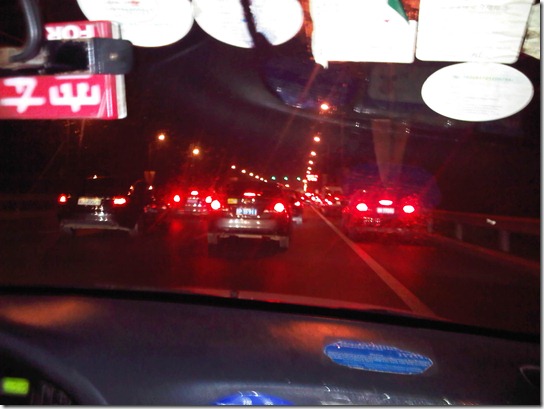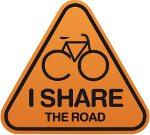Beijing traffic – photo by James Schwartz / The Urban Country
Beijing’s traffic congestion nightmare is perhaps best attributed to the much hailed Deng Xiaoping, the architect of China’s “socialist market economy” – which opened China up to foreign investment and brought significant wealth to the people of China over the past 30 years.
Xiaoping posthumously helped turn Beijing – a city of millions of bicycles – into a city clogged by cars.
Despite Beijing’s extensive ring highway system and its fourteen lane highways cutting through the city, it is still difficult to drive a car in Beijing without encountering traffic congestion.
Playing the lottery in Beijing
To address the rapid increase in car ownership, Beijing has a lottery system that only allows 20,000 new license plates to be registered each month. “Wanna-be” car owners have a 1 in 32 chance of “winning” the opportunity to register their car to provide them the privilege of sitting in Beijing’s traffic congestion.
Last Monday while in Beijing we hopped into a taxi at our airport hotel to meet a family friend for dinner. En route to the restaurant at about 8PM we encountered heavy traffic congestion. The taxi driver told us that the congestion was a result of the 2012 Beijing auto show.
How ironic it is for Beijing’s world famous auto show to cause traffic congestion on Beijing’s highways. The very people who pine for the luxury automobiles on display at the auto show are causing the traffic congestion that prevents those same luxury cars from even coming close to their full potential.
No matter how much you spend on a luxury car, you will still be sitting in the same traffic jam as everybody else.
Beijing’s “Emergency Vehicle” Lane
Speaking of which, unlike in North America, drivers in China rarely pull over to let emergency vehicles past. This is perhaps nowhere more apparent than on the clogged highways of Beijing.
The paved shoulder of the highway is clearly marked as being reserved for “emergency vehicles”. Yet non-emergency vehicles seem to quickly fill this “emergency” lane, leaving no space for real emergency vehicles to proceed.
On our 40 minute drive to dinner, we saw two ambulances with flashing emergency lights and sirens, who were stuck in traffic hardly moving. Nobody made any effort to move over to let the ambulance pass.
The problem has been slowed, not stopped
Despite everything the Beijing government is doing to reduce traffic congestion, there are still 240,000 new cars being added to Beijing’s streets each year. The problem has indeed been slowed, but not stopped.
The best way to truly address traffic congestion is to simply add monetary value to the public good that is in scarce supply – in this case the roads. Congestion fees are a win-win solution because they raise money to improve public transportation and they can eliminate traffic congestion when priced properly.
Optimal efficiency of traffic flow
Roads can still be free to use at off-peak hours when the supply of the roads exceeds the demand, but pricing during peak hours should be done in such a way that creates optimal traffic flow efficiency – a goal that I believe is desirable by people on both sides of the political spectrum.
Here in Toronto, the topic of road tolls comes up frequently, but is quickly dismissed by the public and the media. The problem is that the conversation isn’t being framed properly. Instead of calling it “road taxes” or “road tolls”, let’s talk about improving traffic flow and eliminating traffic jams by creating optimal efficiency on our roads.
We use economic solutions for virtually all other resources that are in scarce supply. When a certain fruit is out of season and supplies are low, the price goes up in order to reduce demand so that the supply matches the demand.
When seats for a popular sporting event are in high demand, the ticket prices are raised and they don’t sell more tickets than the venue can support.
Our roads are like a sporting venue with a finite number of seats, but no limit to the number of tickets that can be sold. If we used our road approach for a sporting event the result would be overcrowding and people would be fighting over the seats (road rage?). It wouldn’t be comfortable for anyone.
Our streets should be priced in such a way that reduces the demand in order to keep automobiles flowing at optimal speeds.
Variable congestion fees will also create new incentives for people to further maximize their efficiency. Driving alone in a large SUV that is built to seat 8 people is not the most efficient way to get around. Congestion fees will create incentives for people to carpool and to take transit, while also creating funding to allow cities to create more efficient and better connected public transit systems.
The technology to achieve the goal of traffic flow efficiency through variable congestion fees is already here, but our society doesn’t seem ready to even explore the possibilities.
Perhaps when we start to experience our own 9-day, 100km long traffic jams here in North America, we will start to open our eyes.
James D. Schwartz is a Transportation Pragmatist and the Editor of The Urban Country. You can contact James at james.schwartz@theurbancountry.com or follow him on Twitter.
Related Articles:
- The Car Once Symbolized Freedom (Apr 2012)
- We Are Addicted To Automobiles (May 2011)
- Car Culture Bleeds Our Society (Aug 2010)
- Refusing To Be Herded Like Cattle (Aug 2010)
- China’s Mega 100KM Traffic Jam (Aug 2010)




While use fees can work they place the burden of change on the user and not on the actual creator of the problems. Impact fees on developers based on traffic volume generated has seen some success when tied to the over all environmental impacts caused by urban developments.
Other solutions originating in Finland and known as traffic calming also lead to a decrease in road use as a side effect of the traffic slowing effects that are part of traffic calming strategies. However, their application to massive freeways is questionable.
There is no doubt we have a problem, the solution however lies in a more comprehensive approach that both changes the way we think and makes it easier to use alternatives. Part of that approach should include the way we think about density in urban environments and that is an attitudinal change that will take time.
While use fees can work they place the burden of change on the user and not on the actual creator of the problems. Impact fees on developers based on traffic volume generated has seen some success when tied to the over all environmental impacts caused by urban developments.
Other solutions originating in Finland and known as traffic calming also lead to a decrease in road use as a side effect of the traffic slowing effects that are part of traffic calming strategies. However, their application to massive freeways is questionable.
There is no doubt we have a problem, the solution however lies in a more comprehensive approach that both changes the way we think and makes it easier to use alternatives. Part of that approach should include the way we think about density in urban environments and that is an attitudinal change that will take time.
James, is car parking subsidized in Beijing, as it is in Europe and America ? Somehow I believe huge chunk of problem is there.
James, is car parking subsidized in Beijing, as it is in Europe and America ? Somehow I believe huge chunk of problem is there.
To get rich is glorious!
-Deng Xiaoping
To get rich is glorious!
-Deng Xiaoping
It is fabulous post.I am impressed from it.can you more share with me.I will come back as soon.
Thanks for more info…….
Quality Used Engines Company
It is fantastic post.I am impressed from this post.can you more share with me.I will come back as soon.
Thanks for more info…….
Quality Used Engines Company
A lottery system for registering new cars? This made me think if that system actually works in minimizing cars on the streets. I can just imagine how it is driving in the streets of Beijing. Must be craaaazy.
A lottery system for registering new cars? This made me think if that system actually works in minimizing cars on the streets. I can just imagine how it is driving in the streets of Beijing. Must be craaaazy.
See any listed employment needs or inquire via mail or email. Some teams accept resumes to keep on file.
See any listed employment needs or inquire via mail or email. Some teams accept resumes to keep on file.
When sporting or other events are frequently sold out, prices are not increased infinitely to encourage more watching of ballet or velodrome races. Instead more seats or larger venues are made. Punishing drivers is the only way to make cycling in hot, cold, and wet more appealing, short of adding motors on bicycles. 50cc scooters are the dominant transit mode in many places – advantages of bicycles plus less work, longer journeys, faster, passenger and cargo accommodation.
When sporting or other events are frequently sold out, prices are not increased infinitely to encourage more watching of ballet or velodrome races. Instead more seats or larger venues are made. Punishing drivers is the only way to make cycling in hot, cold, and wet more appealing, short of adding motors on bicycles. 50cc scooters are the dominant transit mode in many places – advantages of bicycles plus less work, longer journeys, faster, passenger and cargo accommodation.
So cyclists are free of status symbols in their rides, accessories, and attire?
So cyclists are free of status symbols in their rides, accessories, and attire?
Pingback: Beijing Woman Dies Because Ambulance Stuck in Traffic ← The Urban Country